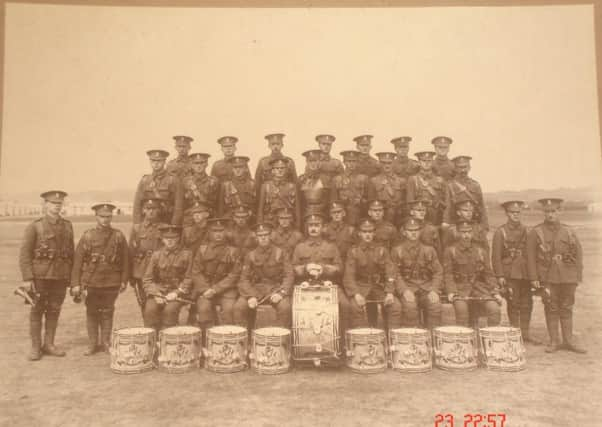Ballymena 1914 - Follow the band


Remember that this was a period with no wlefare state or health service to fall back on.
Living conditions could be poor and many men came to the army underweight and lacking physical fitness.
Advertisement
Hide AdAdvertisement
Hide AdNo army can hope to win wars with soldiers in such a state so a prime aim of basic training was to get the new recruits fit to march long distances (and be capable of fighting at the end of it) and to literally feed them up to make them stronger.
Some soldiers gained a stone in weight and an inch or mor ein height durin g their time in the forces.
It has been argued that vast majority of men who flocked to answer Kitchener’s call in 1914 would not have joined the army under any other circumstances. The same generalisation could be applied to the recruits from Ballymena.
Most of those who joined in September 1914 were town dwellers. They were a mixture of labourers, mill workers, skilled men, clerks and shop assistants. Few had been unemployed at the time of enlistment and most would have been in receipt of wages in excess of the standard army pay of the time.
Advertisement
Hide AdAdvertisement
Hide AdPoverty is often quoted as a reason for enlistment but even cursory research of enlistment papers and reports in the local press of the time demonstrates that the economic factor was negligible.
Peer pressure may have played a significant role but looking back from the cynical perspective of 2010 it would be foolish to dismiss the simple truth that pure patriotism and a desire to ‘act the man’ was the defining motive for a huge number.
Take for example, the membership of two local flute bands. The Ballymena Observer announced in January, 1915:-
The Seven Towers Flute Band have given six of their youngest members to Kitchener’s army and the Royal Navy:- Messrs. James Moore (1st Flute); Robert Parke (2nd Flute); Thos. Colville and Harry Walsh (3rd flute) William J.McNiece (F flute) and Samuel McFetridge (bass drum).
Advertisement
Hide AdAdvertisement
Hide AdThe Young Conquerors Flute Band have also shown a fine example of patriotism in giving seven of their members to the King’s army. The following are the names - Hugh McDowell, Royal Iniskilling Fusiliers; Samuel Wilson, Royal Dublin Fusiliers; James Barr, Hugh Smith, Robert Magee, William J. Magee and James Thompson all of the 12th Royal Irish Rifles.
The following members of Ballymena Brass Band have joined the colours and are now on active service:- John Wallace, double bass, 11th RIR; John Erwin, 1st trombone, RIF; John Davison, 2nd trombone 18th RIR; John McCay, solo cornet 18th RIR; John Anderson, 2nd cornet 12th RIR; David Adair, 2nd cornet 12th RIR; Alexander Wallace, solo horn 12th RIR; Herbert Marshall, 1st baritone 5th RIR; William Blair, flugel horn, 4th RIR; J. Montgomery 2nd horn RIF; W. J. Woodcock 1st trombone Canadian Ex. Force; James McClean, solo cornet, Canadian Ex. Force.
The band has a few young lads endeavouring to learn the instruments so as to keep the organisation moving until the ‘boys’ come back.